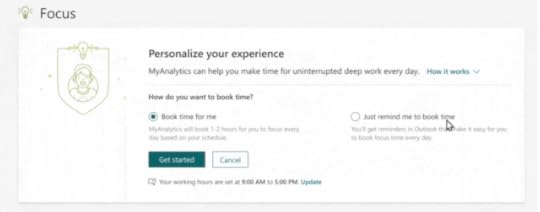Has the Shift Toward Neuro-Productivity Already Begun?

A reader recently pointed me toward an interesting new feature Microsoft added to its widely-used Outlook email and calendar software: support for deep work.
Outlook users can now create a personal “focus plan” that measures how many hours they’re spending dedicated to undistracted work, and can automatically schedule these blocks. Though the tool uses the term “focus time” to label these efforts on your calendar, it also directly uses the term “deep work” in its interface when describing what it’s helping you accomplish (see above).
This is an important shift.
In the first decades of digital knowledge work, human productivity was often viewed through a computer processor metaphor. People were understood as unbounded processors and the goal was to leverage technology to get them as much useful information as possible, with the least amount of friction. In this metaphor, getting more done meant getting more information through the pipeline.
As I’ve been arguing since at least 2016, this is not a useful frame. Humans do not operate on unbounded computer processors, but instead quirky bundles of neurons that have operational properties much different than silicon. If you really want to get more done, you have to understand how human brains actually function, and then arrange for work processes that complement these realities.
Once you start such examinations, one of the most obvious findings is that human brains are not great at context switching. If you want to perform cognitively demanding work, you need to arrange a setting in which your brain can spend time focused on that one task without needing to consider emails, or slack messages, or online news, or Zoom calls, at the same time. An office that segregates deep from shallow work, therefore, should produce more high value output in the same number of total hours.
Given the huge potential productivity gains inherent in a shift toward this neuro-productivity approach, I’ve been convinced that it’s only a matter of time before we began to see large knowledge work players begin to formalize these ideas. Microsoft’s addition of the focus plan feature to Outlook implies that this shift may very well have already begun.
Cal Newport's Blog
- Cal Newport's profile
- 9947 followers



